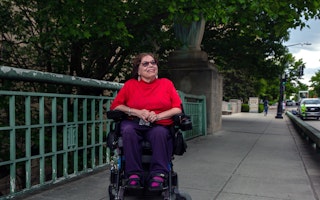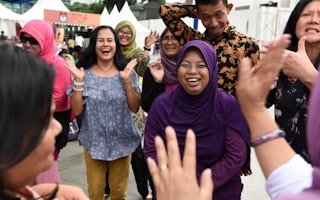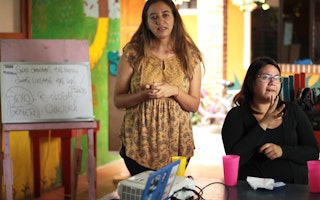I Am Not a Problem to Be Solved
By Boaz Muhumuza

Boaz Muhumuza is the disability rights program officer for Eastern Africa at the Open Society Foundations. Muhumuza grew up in Uganda and lost his sight to retina blastoma at a young age. He graduated with a law degree from Makerere University in Kampala and holds a postgraduate diploma in legal practice.
Growing up in Uganda, I had to travel over 600 kilometers from my home in order to find a school for the blind. But I was lucky. Many children in East Africa who are blind, deaf, or have an intellectual disability never receive a proper education. People with psychosocial disabilities are often put into treatment centers that are as good as prisons.
Beyond institutional barriers, people with disabilities also struggle against attitudes. People often assume that we cannot make our own decisions, like where and with whom we want to live. We are denied the freedom to make wrong or right choices. People don’t understand that an impairment—like being unable to see—does not affect my other faculties. The fact that I don’t see doesn’t mean that I don’t think. The fact that a person has a mental health problem doesn’t mean that he or she doesn’t have desires, that they are unable to like certain things and hate others.
Fortunately, there is real hope for a change in how people view disability rights in Africa thanks to the United Nations Convention on Rights of Persons with Disabilities. The convention is an international legal instrument that enshrines the rights of persons with disabilities. It was enacted in 2006, and almost every country in East Africa has signed and ratified the convention. By virtue of ratification, these countries are now legally bound to ensure that the rights contained in the convention are put into practice.
But even though so many countries in the region ratified the convention, its details are not well understood—even for those of us who are working on them. We still struggle to figure out what the rights mean in practice. What does it mean for a person with disabilities to have choice? What does it mean for you to say that a person with a mental health challenge has a right to vote?
Understanding the convention in the African context is even more complex. What does it mean if you’re fighting for inclusion of people with disabilities in the community when there are no institutions? In Europe or America the answer is easier. There people with disabilities are put into institutions, and inclusion has a clear meaning. But in Africa—where there are fewer institutions—discrimination happens most often in the community in which the person lives. We need experts who can flesh out the policy in a local context.
This will mean shifting the framework for how people view disabilities. Previously disability was seen in one of two ways, either as a medical problem or a condition that evoked sympathy or pity. People have often asked me, “Have you tried to go to a hospital for your eyes to be treated?” They look at my lack of sight as the problem that should be solved. Or they see me only as someone to be pitied. This approach leads to placing people in institutions. Because the blind need services, people think the solution is to put all blind people into one building.
The human rights framework is meant to shift the problem from the person to the environment. The problem is not that I cannot see, but that my environment is limiting.
Let’s take an example. If you have an elevator in a building and I’m using a wheelchair, I will come with my wheelchair, enter this elevator and arrive at the seventh floor. If you have no elevator you will have disabled me. I’ll come with my wheelchair, but I will be unable to reach my intended floor. But if I had a wheelchair and you have the elevator it means that whether someone is walking with his or her legs and I’m using a wheelchair, who cares? We are all able to get to the same place. If the environment is improved then the person who is blind or paralyzed or deaf can perform as well as the others. That’s where the human rights approach comes in.
People often wonder how these environmental changes can be made when resources are scarce, but much of what we are requesting is not big. Reasonable accommodation allows for changes that are neither too expensive nor too difficult for someone to implement. After all, why should someone be able to construct an 8-floor building and say that they don’t have resources for an elevator?
The question of resource scarcity is a challenge. But governments must realize that people with disabilities constitute 10 percent of the world, and many of the changes we need are quite small and don’t cost too much money. Even changing attitudes—for example having doctors address me and not the person I came with—would go a long way.
We need awareness and education, so that people can understand disability. We need laws and policies to create an environment that is positive to persons with disabilities, and we need to respect the choices of persons with disabilities. Their choices, their capacity, and their abilities, we need to respect them.
Until December 2017, Boaz Muhumuza was the disability rights program officer for Eastern Africa at the Open Society Human Rights Initiative.


